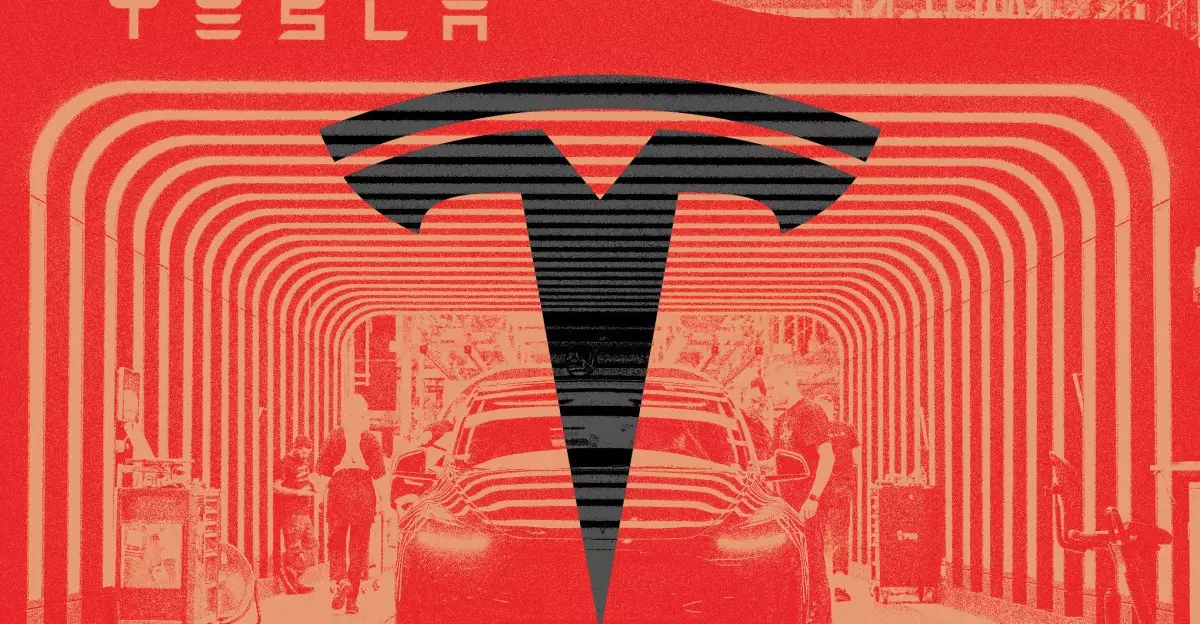Tesla, once hailed as the vanguard of electric vehicles (EVs), is encountering a significant blow in European markets, with sales plunging by nearly 50% in April compared to the previous year. This dramatic decline has raised alarms among industry analysts and enthusiasts alike, signaling deeper issues within the Tesla brand and its overall market strategy. When a company that has dominated headlines for years suddenly sees its performance plummet, it is essential to scrutinize the multiple facets contributing to this alarming trend.
The European market is vital for Tesla, as it represents a significant segment of their global sales. Yet, while overall EV sales surged by 26.4% in the same month, Tesla seems unable to keep pace. The stark contrast emphasizes that the issue lies not with declining consumer interest in electric vehicles but with Tesla’s brand execution and market strategy. The urgent need for a thorough reassessment becomes abundantly clear as Tesla logged a mere 7,261 new vehicle registrations during a traditionally flourishing sales period.
Competition Breeding Frustration
As competition proliferates in the European EV market, Tesla appears to be faltering. Historically, Tesla has maintained a competitive edge through innovation and brand loyalty; however, an influx of newfound domestic manufacturers and Chinese rivals is reshaping the landscape. The aura of exclusivity that once surrounded Tesla has faded as consumers enjoy a cornucopia of choices that offer comparable, if not superior, features or pricing.
Brands that previously operated in Tesla’s shadow are now stepping into the limelight, enticing customers who may have once opted for a Model 3 or Model Y. Coupled with rising competition, frustrations among existing Tesla owners regarding service delays, build-quality issues, and inadequate customer support have sown seeds of doubt about Tesla’s reliability. When consumers perceive a decline in quality and support from a brand, loyalty can wane rapidly, placing the future of Tesla at a crossroads.
Musk’s Political Maneuvers: A Double-Edged Sword
Elon Musk’s penchant for political engagement has taken center stage, and not in a way that bolsters Tesla’s image. His vocal support for controversial political figures, including backing Germany’s far-right party ahead of elections, has alienated many potential customers. Musk’s Twitter activity and public statements have transitioned from being charming quips to sources of contention for many consumers who value corporate responsibility and ethical positions.
Despite Musk’s insistence that his political involvements would not interfere with Tesla’s business, the public sentiment appears adversely affected. Recent polls reveal a considerable decline in Musk’s favorability ratings, with 58% of respondents expressing unfavorable views towards him. This fallout is a stark reminder that a company’s image cannot be isolated from its founder’s actions.
Brand Reputation: A Sinkhole of Trust
The declining perception of Tesla as a leading brand is another critical factor exacerbating their current woes. Once lauded for its groundbreaking advancements and aspirational branding, Tesla now finds itself ranked poorly in polls measuring company reputation. This downward shift—moving from 8th place to 95th—puts Tesla at risk of losing not just market share, but consumer trust.
Trust in a brand is paramount, especially as consumers are increasingly informed and selective about their purchases. The aging narrative that once enamored consumers is losing its luster. Customers today are armed with information and alternative options, making Tesla’s previous advantages seem less pertinent.
The Path Forward: A Sombre Outlook
Despite Musk’s assurances of an impending turnaround, deep-rooted challenges await resolution. Tesla must tackle the simultaneous pressures of external competition and internal brand perception. The stunning sales decline serves as a critical inflection point, suggesting that without a recalibration of strategies, Tesla’s commitment to innovation and market leadership may falter. While Musk’s focus may currently lie on advanced technology and ambitious projects, the need for immediate attention to consumer sentiment and operational excellence persists.
Tesla’s identity, intricately tied to its founder’s persona, may be at a pivotal juncture where real change is needed to regain market favor. Whether Tesla can navigate this turbulent period and reestablish its supremacy in the EV arena remains to be seen. What’s undeniable is that the road ahead is fraught with challenges that demand astute strategies and an unwavering commitment to customer satisfaction, lest it loses its revered position in the automotive world altogether.

